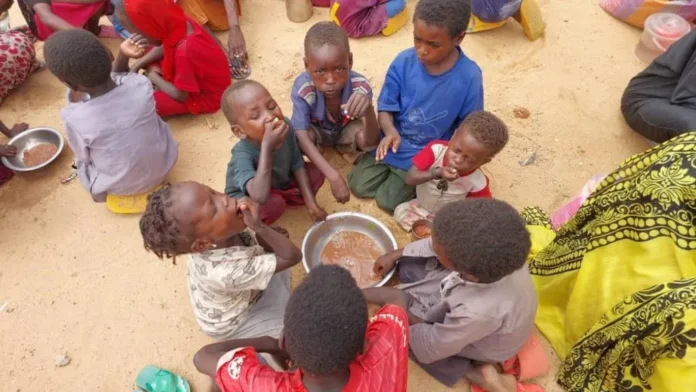Written by Lisa Murimi
The humanitarian crisis in El-Fasher, the last stronghold of Sudan’s army in Darfur, has reached catastrophic levels as a 14-month siege by the Rapid Support Forces (RSF) cuts off food, medicine, and clean water to hundreds of thousands of civilians.
Residents describe life in the city as a fight for survival. At the Matbakh-al-Khair communal kitchen, volunteers prepare ambaz — peanut residue typically fed to livestock — for families who have nothing else to eat.
Sorghum and millet are scarce, and food prices have soared so sharply that what once bought a week’s worth of meals now covers only one.
“We’re exhausted… Our children are dying before our eyes,” one woman told the BBC.
Aid agencies, including the Norwegian Refugee Council, warn of “the calculated use of starvation as a weapon of war,” with market prices rising beyond reach even for those who can access emergency cash transfers.
The siege has coincided with a deadly cholera outbreak. Contaminated water, exacerbated by flooding and the collapse of sanitation infrastructure, is sweeping through overcrowded displacement camps.
Médecins Sans Frontières estimates residents have access to just three litres of water per person per day — far below the minimum survival standard.
Hospitals in El-Fasher are barely functioning. Many have been damaged by shelling and lack essential medical supplies.
At Al Saudi Hospital, paediatrician Dr. Ibrahim Abdullah Khater says five severely malnourished children are “just waiting for their death” due to the absence of therapeutic food.
“The situation is catastrophic… the international community is just watching,” he said.
The UN has renewed calls for a humanitarian pause to allow aid convoys into the city. While the army has authorised access, RSF leaders have yet to agree, insisting any truce could be exploited to resupply “besieged militias.”
They claim to be creating “safe routes” for civilians to leave, but international NGOs say those fleeing face attacks, extortion, and arbitrary taxation at checkpoints.
Tens of thousands have managed to escape, many from the Zamzam displacement camp, seized by the RSF in April. They arrive in Tawila, 60km west of El-Fasher, weak and dehydrated. Though aid agencies can operate there, resources remain severely limited.
“We have shortages in terms of medical supplies and water facilities,” said John Joseph Ocheibi of The Alliance for International Medical Action.
Life in Tawila’s camps may be safer from shelling, but disease stalks residents. Pregnant women, like Zubaida Ismail Ishaq, who fled El-Fasher only to contract cholera, tell of losing livelihoods, family members captured by armed groups, and children injured in attacks.
“We drink water without boiling it… I have nothing left,” she said.
Aid agencies warn that deliberate obstruction of relief, destruction of critical infrastructure, and reports of food hoarding for military use are worsening the crisis.
Without immediate international intervention, they say, the combined impact of famine, disease, and ongoing violence could push El-Fasher’s civilian population into irreversible collapse.



















